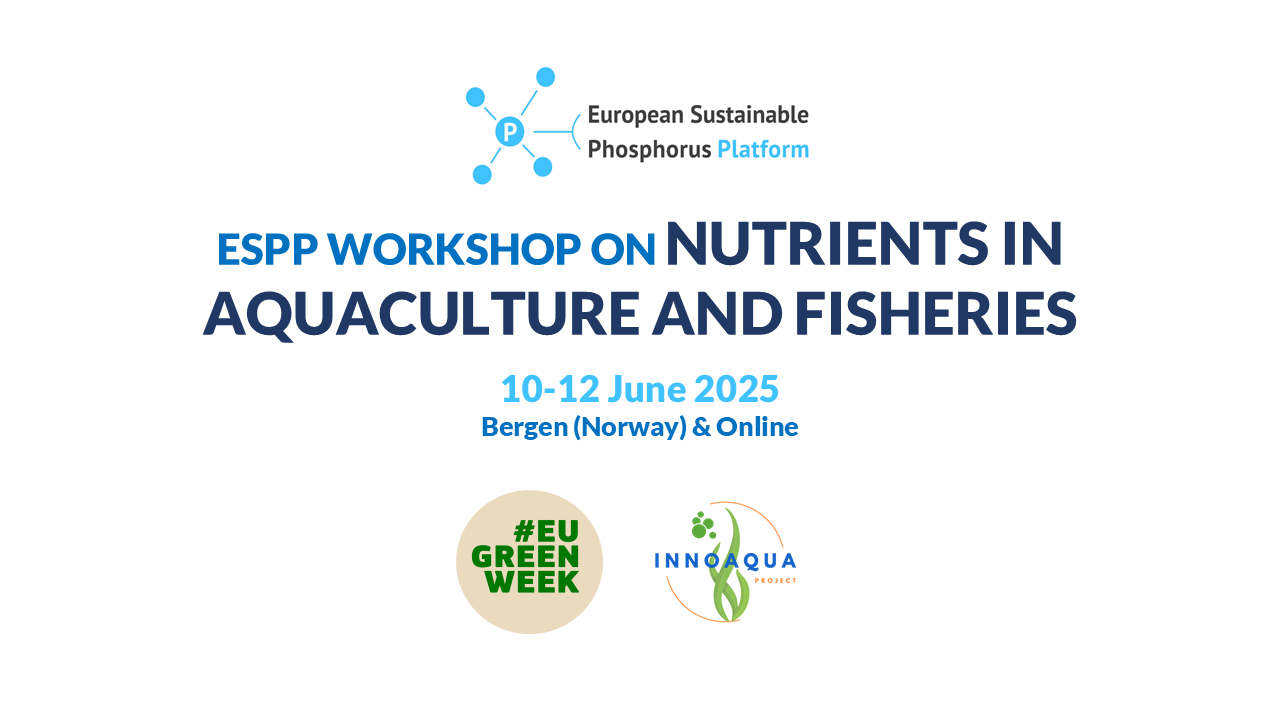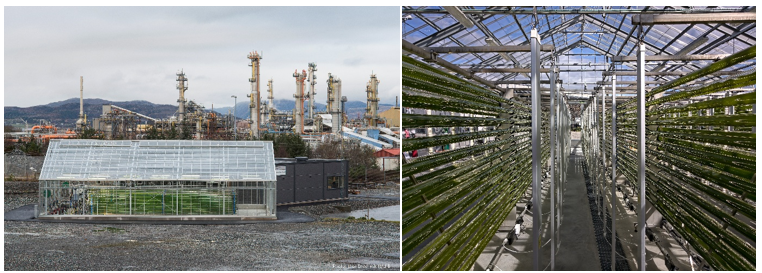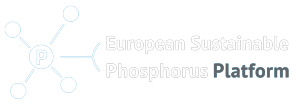 https://phosphorusplatform.eu/AquacultureFisheries
https://phosphorusplatform.eu/AquacultureFisheries
10-12 June 2025, Bergen (Norway) & online. ESPP workshop, with partners in Norway and with UNEP uPcycle, on nutrient management in aquaculture feed, seafood processing and fish sludge valorisation, covering nutrient flows, environmental best practice, phosphorus recycling, regulatory challenges. The workshop will contribute to the United Nations (UNEP) project uPcycle, leading to a UNEP white paper on phosphorus sustainability in aquaculture. Site visits: fish sludge collection, algae growth plant.
The workshop is a EU GREEN WEEK PARTNER EVENT and is organised with the support of the project INNOAQUA (funded by the EU under Grant agreement 101084383).
If you would potentially contribute, please email indications of your organisation’s areas of interest, competence, possible content of presentation, to
Event location
Bergen (Norway) @ NORCE (Nygårdsgaten 112/114, 5008 Bergen) + online.
Outline programme
10 June 2025
| 13.30 – 14.00 | Registration and welcome coffee |
| 14.00 – 14.15 |
Opening and welcome by organisers
|
| 14.15 – 15.45 |
Perspectives on sustainability in aquaculture (Moderator: Will Brownlie, UK CEH)
|
| 15.45 – 16.15 | Coffee break |
| 16.15 – 18.00 |
Parallel session: Aquaculture sustainability, LCA, circular business models (Moderator: Dorinde Kleinegris, NORCE)
Parallel session: Efficiency of use of nutrients in aquaculture feed (Moderator: Chris Thornton, ESPP)
|
| 19.30 | Networking dinner |
11 June 2025
| 8.30 – 9.00 | Registration and welcome coffee |
| 9.00 - 10.30 |
Taking forward aquaculture nutrient sustainability (Moderator: Will Brownlie, UK CEH)
Panel session on "Phosphorus and the blue bio-economy: should Norway have a national phosphorus strategy?". Each year, around 14,000 tons of phosphorus from Norwegian aquaculture are lost to fjords, while up to 11,000 tons could potentially be recovered—an amount that could grow with better technology. Given similar production levels, Europe may have comparable recovery potential. Recovering this phosphorus would not only have economic value but also bring significant environmental and climate benefits. Let’s discuss with Bellona and the panelists how we can turn this untapped resource into a key part of a circular phosphorus strategy. Panel: Will Brownlie, UK CEH; Jostein Iversen, Grieg; Ole-Arthur Vaage, RagnSells; Erik-Jan Lock, Nofima; Øystein Jørem, Yara |
| 10.30 - 11.00 | Coffee Break |
| 11.00 - 12.45 |
Parallel session: Aquaculture sludge recycling via algae and biomass growth (Moderator: Elise Gallois, UK CEH)
Parallel session: Recycling of aquaculture sludge to agriculture and nutrient recycling (Moderator: Chris Thornton, ESPP)
|
| 12.45 – 13.45 | Lunch |
| 13.45 – 14.45 |
Regulatory obstacles to aquaculture nutrient recycling (Moderator: Will Brownlie, UK CEH)
|
| 14.45 – 15.45 | UNEP uPcycle white paper discussion, led by Will Brownlie, UK CEH |
| 15.45 – 16.00 | Closing |
12 June 2025
9.00 Optional site visit to National Algaepilot Mongstad or to Lerøy Seafood fish farm with sludge recovery in Skaftå.
Registration
Available on Eventbrite (registration for participating in Bergen closing on 6th June).
Site visits description
The National Algaepilot Mongstad is a state-of-the-art research facility dedicated to the development and demonstration of sustainable production processes of microalgae (TRL 5-6), as well as for the production of large quantities (100’s of kilos) of microalgal biomass for further testing and development of new products (food, feed, chemicals). For example, in the INNOAQUA project, around 200 kg of microalgal paste of three different microalgae strains were produced, that are now tested in a biorefinery approach to extract various ingredients (e.g., omega-3 rich oils, proteins, pigments) that are used for food formulation. The facility consists of a greenhouse with various types of photobioreactors, and a basic laboratory and office as well as the related infrastructure (water treatment, harvesting equipment) in the annex, and is owned by the University of Bergen, and operated in close collaboration with NORCE. During the visit, you will have the opportunity to tour the facilities, and gain insights into our research initiatives and technological advancements.
The facility is located at industry park Mongstad, approximately one hour north-west from Bergen. We will travel to the facility by bus, leaving at 09h00 from Marineholmen (Thormøhlensgate 55, 5006) in Bergen, back around 12h30. Fare for the visit is 20€.
For more information, please contact Dorinde Kleinegris:

- Lerøy Seafood location in Skaftå:
Participants will visit one of Lerøy Sjøtroll’s aquaculture facilities in Sørfjorden near Osterøy, where a pioneering sludge collection system has been developed in collaboration with FRAMO Lift Up and Aquapro. This system effectively captures natural waste such as uneaten feed and fish faeces from net-pens using a fine-meshed net and filtration process. The collected sludge is pumped into surface tanks and transported by boat to Denmark and Norway, where it is converted into biogas. This visit offers a unique opportunity to explore sustainable waste management practices in aquaculture within a sensitive fjord environment. Fare for the visit is 20€.

Meeting point: Bergen Harbour 12 June at 09.00
Time: Thursday 12 June at 09.00 – 12.00
| 09.00 | Departure from Bergen harbour |
| 10.00 | Arrival location and visit |
| 11.00 | Departure from location |
| 12.00 | Arrival at Bergen harbour |
